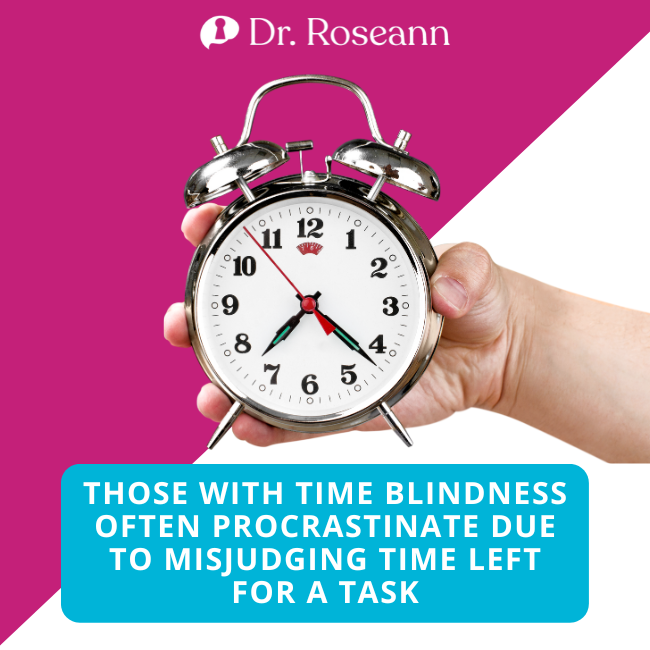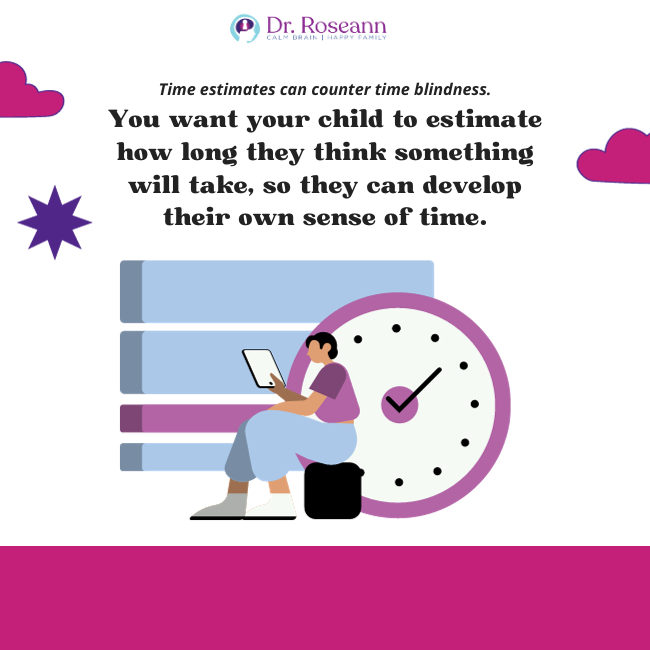Time blindness is a little-understood challenge and it's very common among people with Attention Deficit Hyperactivity Disorder. Every parent should understand what time blindness is, its connection to ADHD, and how you can support your child or teen through it.
ADHD is a neurodevelopmental disorder characterized by difficulties with attention, hyperactivity, and impulsivity, often leading to challenges in daily functioning, especially in tasks requiring focus and self-control. It's one of those mental health conditions where a person may lose sense of time while experiencing executive dysfunction.
What is Time Blindness?
Time blindness, also known as “chronic presentism,” refers to the difficulty or inability to accurately gauge the passage of time and anticipate future events. Children with time blindness struggle to grasp how long tasks will take, how much time has passed, or how much time is left for a particular activity.
The concept of time blindness is especially prevalent among people with ADHD and can significantly impact their ability to manage time, plan ahead, meet deadlines, and transition between different tasks.
For them, time blindness means struggling to perceive, estimate, and manage time accurately. This struggle stems from neurological differences in the prefrontal cortex and the compounded effects of other ADHD symptoms like impulsivity and attention deficits.
Time blindness differs from the average perception of time, where most people can intuitively estimate how long a task will take, judge how long it has passed, and anticipate upcoming events with reasonable accuracy.
The Role of the Prefrontal Cortex in Time Perception
- Understanding time blindness begins with a look at the brain. At the heart of this struggle lies the prefrontal cortex (PFC), a region responsible for various executive functions, including time management. Here's how it plays a key role in our perception of time:
- Executive Functions: The PFC is chiefly responsible for executive functions, which include skills like planning, organization, decision-making, and, importantly, time management.
- Temporal Processing: The PFC is involved in estimating the length of time intervals, foreseeing future events, and making predictions based on elapsed time. This kind of processing helps us gauge how much time we have for tasks, when we should leave for an appointment, etc.
- Working Memory: The PFC supports working memory, which helps us hold and manipulate temporal information. This can be related to how long ago something occurred or how much time is left before something else happens.Decision Making: The PFC helps us decide how to allocate our time, prioritizing tasks based on how much time they will take and how urgent they are.
How ADHD Affects The Prefrontal Cortex
ADHD profoundly affects the prefrontal cortex. Children with ADHD frequently exhibit notable differences in this part of the brain, resulting in challenges in regulating attention and behavior. An understanding of how ADHD impacts this crucial brain region is pivotal for developing effective strategies for diagnosis and treatment.
Structural Differences
Some studies suggest that there are slight structural differences in the prefrontal cortex of individuals with ADHD compared to those without (Frodl & Skokauskas, 2011). It may include differences in the size or connectivity of this region.
Functional Differences
Functional MRI (fMRI) studies have shown that individuals with ADHD may exhibit different patterns of brain activity in the PFC when engaging in tasks that involve executive functions (Fassbender et al., 2004). It also indicates differences in how this region processes information or communicates with other brain regions.
Neurotransmitter Levels
ADHD has been linked to imbalances in certain neurotransmitters, particularly dopamine and norepinephrine (Mehta et al., 2019). These chemicals play a role in regulating various functions in the PFC, including attention and temporal processing.
Impaired Temporal Processing
Given the critical role of the PFC in time perception, any disruptions or abnormalities in its function, as seen in ADHD, can lead to impaired temporal processing. Such symptoms manifest as time blindness, where accurately perceiving, managing, and estimating how much time is left is a struggle.
Compounded Effects
The challenges with time perception in ADHD are not only due to the direct effects on the PFC but also due to the interplay between attention, working memory, impulsivity, and other ADHD symptoms. For instance, if someone is easily distracted, which is a hallmark ADHD symptom, they're more likely to lose track of time.
Symptoms and Indicators of Time Blindness
- Understanding time blindness involves recognizing its symptoms and indicators. Here are some common signs:
- Difficulty estimating how long a task will take: People with time blindness often underestimate or overestimate the time required to complete tasks, leading to poor planning and time management.
- Struggling with punctuality: Chronic lateness is a classic symptom of time blindness, as those affected struggle to judge how long it takes to get ready or travel to a destination.Procrastinating due to misjudging time left for a task: They may believe they have more time than they actually do, leading to last minute rushes or unfinished tasks.

- Overlooking upcoming events or deadlines: Children with time blindness might forget or miss appointments, events, or deadlines because they lose track of time.
Real-World Implications of Time Blindness
Time blindness doesn't just exist in the abstract; it has real-world consequences that affect different aspects of an individual's life. It can lead to difficulties staying on schedule and managing daily tasks effectively.
Students with ADHD may struggle with test-taking and homework completion. They might find it difficult to pace themselves during exams, leading to incomplete tests or time mismanagement when studying.
When it comes to personal relationships, being late for appointments, family gatherings, or social events can strain relationships. Loved ones may feel hurt or neglected when adults with ADHD lose track of time and prioritize other activities.
The emotional aspect of time blindness is often underestimated. Individuals with ADHD and time blindness can experience intense frustration and anxiety due to their time-related challenges. They might feel like they're constantly playing catch-up, which can erode their self-esteem and well-being.
Building self-awareness and self-compassion is crucial for these individuals. They need to recognize that their struggles with time perception are not indicative of a lack of effort or ability. Instead, it's a neurological challenge that can be managed with the right support and strategies.
Coping Mechanisms and Strategies for Time Blindness
Fortunately, there are coping mechanisms and strategies that can help individuals with time blindness navigate their lives more effectively. Here are some practical ways to manage time blindness:
1. Use Timers and Alarms for Reminders
Timers and alarms are invaluable tools. Using a timer for a specific task can help individuals stay on track and remind them when it's time to move on to the next activity. Setting multiple alarms for each task may be helpful.
2. Create Visual Aids
The use of a digital calendar or a time-tracking apps can serve as a visual aids that offer a tangible representation of time. These tools can help individuals plan their schedules and allocate time more effectively.
3. Set Aside Specific Blocks of Time for Tasks
Blocking out a specific amount of time for tasks or activities can provide structure and prevent procrastination. These practical approaches help children focus on one task at a time. The use of digital calendar to create a to-do list helps as well.
4. Utilize Transitional Rituals to Better Anticipate Changes
Transitioning between activities can be challenging for people with time blindness. Creating transitional rituals, like taking a short breaks between tasks, can help individuals better manage their time and shift their focus.
5. Practice Understanding and Patience
It's essential to acknowledge the challenges associated with time blindness and provide a supportive, non-judgmental environment. Demonstrating understanding and patience can help reduce frustration and anxiety.
6. Helping Establish Routines
Establishing routines can provide a sense of predictability and structure. Encourage consistent daily routines that help individuals manage their time more effectively.
7. Assisting in Setting Up Organizational Tools
Help individuals with time blindness set up and effectively use organizational tools like calendars or time-tracking apps. Offer guidance and support as needed.
8. Creating Time Estimates
When planning activities, tasks or events, provide clear time estimates. For example, if you're planning a family outing, share an approximate duration for each activity so the individual can better prepare.
You want your child to estimate how long they think something will take, so they can develop their own sense of time.

9. Promote Good Sleep Hygiene
Sleep deprivation can worsen time perception issues and other ADHD symptoms. Make sure that your child gets enough sleep everyday to maintain a well-balanced internal clock.
Success Story: Emma's Journey
Many children with ADHD struggle with time blindness but it is possible to overcome it. Their stories highlight the effectiveness of natural solutions and strategies. Emma’s story is a good example of that.
Emma is an ADHD kid, who used to struggle with punctuality and time management. She often found herself running late for school and appointments. With the support of her parents and the BrainBehaviorResetTM, Emma learned to set timers and alarms 15 minutes before the task starts or ends as a reminder. She also started using a visual calendar to plan her day. Over time, she developed better time management skills and became more punctual.
The BrainBehaviorResetTM Program is a comprehensive science-back, natural treatment method to address the specific challenges faced by individuals with ADHD, particularly focusing on a lesser-known aspect of the condition: time blindness.
This program employs a multi-faceted approach, integrating neurofeedback, cognitive training, PEMF. natural therapy, magnesium supplements, and lifestyle modifications to help individuals with ADHD regain control over their perception of time and enhance their executive functions. By targeting time blindness and its impact on daily life, this program offers a promising path to improving the overall quality of life for those living with ADHD.
As research on ADHD and time perception continues, potential treatments and interventions may emerge. But the most important thing to do is to understand how the ADHD brain processes time and how it differs in individuals with ADHD can lead to innovative therapies and natural solutions. It's crucial to stay informed about the latest advancements in this field.
Time blindness is a complex and challenging aspect of ADHD that affects not only the individual but also their families and relationships. Understanding the neurological foundations of time perception, recognizing its symptoms, and implementing coping strategies allow children with ADHD to live in the present moment and navigate time more effectively. Seeking professional help allows these young adults to build healthier relationships with time and, in turn, enhance their overall well-being.
Parent Action Steps
☐ Learn about ADHD and time blindness to better understand your child's challenges.
☐ Consult ADHD specialists for a formal evaluation and expert advice.
☐ Foster a judgment-free space for your child to express their struggles.
☐ Help your child recognize that their challenges are not their fault.
☐ Counter low self-esteem by promoting self-compassion.
☐ Set a timer or alarm to help with managing time effectively.
☐ Communicate with teachers and request reasonable accommodations if needed.
☐ Share time estimation techniques and reminders to aid in task planning.
☐ Encourage your child to take responsibility for managing their time gradually.
☐ Be patient and flexible when challenges arise due to time blindness.
☐ Acknowledge and celebrate your child's achievements in managing their time.
☐ Promote understanding and empathy in your community and schools.
☐ Keep up with the latest ADHD research and be open to new developments.
☐ Prioritize your well-being to better support your child.
☐ Join parent support groups for guidance and emotional support.
☐ Take this ADHD Quiz to know if your child has ADHD or something else.
☐ Try the Solutions Matcher to get personalized treatment for your child.
Citations:
Fassbender, C., Murphy, K., Foxe, J. J., Wylie, G. R., Javitt, D. C., Robertson, I. H., & Garavan, H. (2004). A topography of executive functions and their interactions revealed by functional magnetic resonance imaging. Cognitive Brain Research, 20(2), 132–143. https://doi.org/10.1016/j.cogbrainres.2004.02.007
Frodl, T., & Skokauskas, N. (2011). Meta-analysis of structural MRI studies in children and adults with attention deficit hyperactivity disorder indicates treatment effects. Acta Psychiatrica Scandinavica, 125(2), 114–126. https://doi.org/10.1111/j.1600-0447.2011.01786.x
Mehta, T. R., Monegro, A., Nene, Y., Fayyaz, M., & Bollu, P. C. (2019). Neurobiology of ADHD: A Review. Current Developmental Disorders Reports, 6(4), 235–240. https://doi.org/10.1007/s40474-019-00182-w
Are you looking for SOLUTIONS for your struggling child or teen?
Dr. Roseann and her team are all about science-backed solutions, so you are in the right place!
Grab your complimentary copy of
147 Therapist-Endorsed Self-Regulation Strategies for Children: A Practical Guide for Parents
You can get her books for parents and professionals, including: It’s Gonna Be OK™: Proven Ways to Improve Your Child’s Mental Health, Teletherapy Toolkit™ and Brain Under Attack: A Resource For Parents and Caregivers of Children With PANS, PANDAS, and Autoimmune Encephalopathy.
If you are a business or organization that needs proactive guidance to support employee mental health or an organization looking for a brand representative, check out Dr. Roseann’s professional speaking page to see how we can work together.
Dr. Roseann is a Children’s Mental Health Expert and Therapist who has been featured in/on hundreds of media outlets including, CBS, NBC, FOX News, PIX11 NYC, The New York Times, The Washington Post, Business Insider, USA Today, CNET, Marth Stewart, and PARENTS. FORBES called her, “A thought leader in children’s mental health.”

She is the founder and director of The Global Institute of Children’s Mental Health and Dr. Roseann Capanna-Hodge, LLC. Dr. Roseann is a Board Certified Neurofeedback (BCN) Practitioner, a Board Member of the Northeast Region Biofeedback Society (NRBS), Certified Integrative Mental Health Professional (CIMHP) and an Amen Clinic Certified Brain Health Coach. She is also a member of The International Lyme Disease and Associated Disease Society (ILADS), The American Psychological Association (APA), Anxiety and Depression Association of America (ADAA) National Association of School Psychologists (NASP), International OCD Foundation (IOCDF) International Society for Neurofeedback and Research (ISNR) and The Association of Applied Psychophysiology and Biofeedback (AAPB).
© Roseann-Capanna-Hodge, LLC 2023










